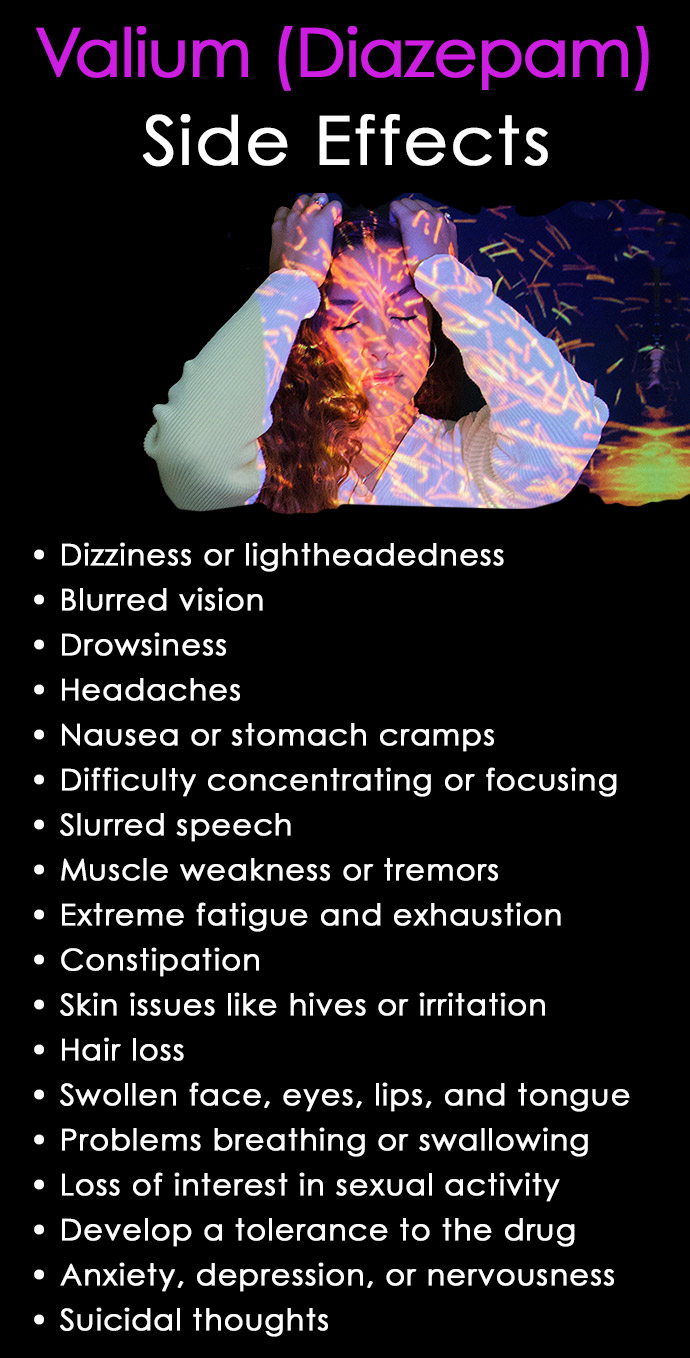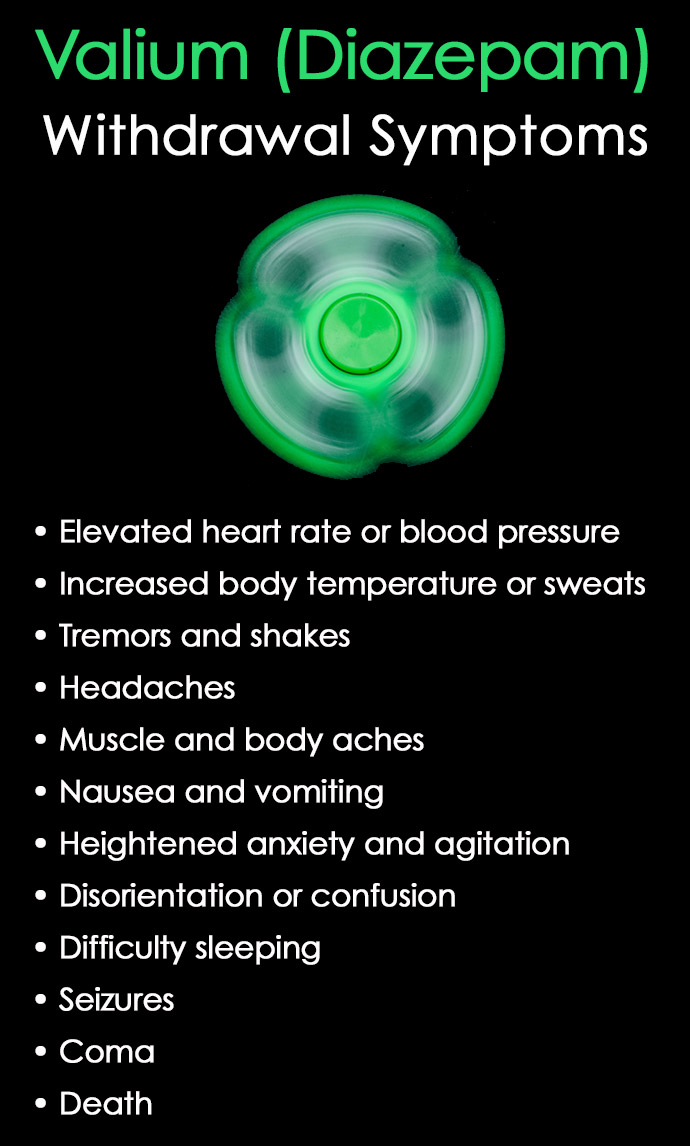Table of Contents
Benzodiazepines like Valium (diazepam) are used for treating anxiety and other disorders, but they are only intended for short-term use. When misused, Valium side effects and withdrawal symptoms of diazepam can be dangerous and cause serious health issues.
While often necessary to improve physical or mental health, certain prescription drugs like Valium can lead to dependence. They should only be used as directed, especially because the medication is known to be habit forming and addictive.
Research from the National Institute on Drug Abuse (NIDA) suggests that an estimated 17 percent of people taking benzodiazepines like diazepam misuse them.
These types of prescription medications are also associated with emergency room visits, mental health disorders, and substance abuse.
Understanding the adverse Valium side effects and diazepam withdrawal symptoms is important for avoiding unwanted health problems.
What is Valium (Diazepam)?
Valium is the brand name for diazepam, a type of benzodiazepine similar to medications like Xanax, Ativan, and Klonopin.
Like other benzos, Valium is a central nervous depressant that works by slowing down activity in the brain. The drug has a sedative effect and is also known to relax the muscles.
The tranquilizing effect that diazepam has on users is one of the reasons the medication can quickly become habit forming. When misused or combined with other substances, like alcohol, the dangerous side effects of Valium can be even greater.
This is why diazepam is typically prescribed at the lowest possible dose for a short period of time.
The likelihood of addiction to diazepam increases the longer a person uses the drug.
Those who have taken Valium for long periods of time must speak with a doctor before quitting in order to avoid uncomfortable and potentially dangerous withdrawal symptoms.
What is Valium Used For?
Like other benzos, Valium (diazepam) is used for treating symptoms associated with generalized anxiety disorder.
In addition, Valium is used for treating seizure disorders because it exhibits tranquilizing properties.
Valium effects generally act more quickly than other types of benzos. Most people will notice the effects within one hour, although for others they may begin in half that time.
Diazepam has increasingly been prescribed to help patients going through acute alcohol withdrawal during detox, which is known for uncomfortable symptoms.
Because it’s a sedative, physicians will sometimes prescribe one Valium to patients before they undergo minor medical procedures.
Sometimes, Valium is used for reducing painful muscle spasms and stiffness because of its calming effect on the nervous system.
Valium Side Effects
As noted earlier, it’s important to only take it as prescribed by a doctor because of the known Valium side effects.
Missing a scheduled dose or combining it with alcohol or other substances significantly increases the likelihood of dangerous physical or mental health complications.
Valium side effects can include some of the following:
- Dizziness or lightheadedness
- Blurred vision
- Drowsiness
- Headaches
- Nausea or stomach cramps
- Difficulty concentrating or focusing
- Slurred speech
- Muscle weakness or tremors
- Extreme fatigue and exhaustion
- Constipation
- Skin issues like hives or irritation
- Hair loss
- Swollen face, eyes, lips, and tongue
- Problems breathing or swallowing
- Loss of interest in sexual activity or inability to get aroused
- Developing a tolerance to the medication and needing more of it to produce similar effects, which is a sign of dependence
- A spike in feelings of anxiety, symptoms of depression, or nervousness
- Suicidal thoughts
Some of the Valium side effects mentioned require immediate medical attention or they can lead to serious health problems.
If a person shows signs of a physical dependency or addiction, professional benzodiazepine withdrawal and detox treatment may be necessary to safely stop taking the drug and avoid serious health complications.
In many cases, the fear of withdrawal is what keeps people in a prolonged cycle of dependency and benzodiazepine abuse.
Valium Side Effects and Precautions
It’s important to be aware of the risks and precautions when taking Valium (diazepam) or any benzodiazepines.
Because some people may not be able to tolerate Valium side effects or it isn’t effective for them, Klonopin (Clonazepam) is occasionally prescribed as an alternative.
Valium can cause a dependence or addiction, and it should not be prescribed for long-term use. It is typically safe when used for less than four months.
It should not be used by anyone who is pregnant, breastfeeding, or considering becoming pregnant in the near term because it can cause withdrawal symptoms for the baby.
Benzodiazepines have a calming effect on the body and they should not be taken in combination with alcohol, opioids, or other depressant medications.
It is rare for a person to overdose on benzos alone when taken according to the prescribed dose, unless they are mixed with alcohol, opioids, or similar depressants.
Valium can last in the body for several weeks after the last dose and still show up on a urine test.
Because Valium can remain in the body for some time after a person stops taking it, alcohol should not be used until after it completely leaves the body.
This type of drug might be unsafe to take with certain health conditions such as lung or liver problems, sleep apnea, and others. Always be open and honest with your doctor about all health conditions and other medications before being prescribed Valium.
It can cause the user to become dizzy or tired, so it is not advised to drive or engage in activities that require a person to be alert.
Most importantly, never stop taking the medication all at once without consulting with a doctor because it can lead to serious withdrawal symptoms.
Valium Withdrawal Symptoms
Valium withdrawal symptoms can be particularly uncomfortable and sometimes involve an intense craving for the drug.
Ironically, some of the symptoms the medication is prescribed to treat, like anxiety, may return during withdrawal in the form of rebound anxiety.
It’s not uncommon for new symptoms such as depression to appear for the first time.
In very serious cases, benzo withdrawal symptoms can be potentially life threatening due to the possibility of a coma or seizures.
For people who have continuously taken the drug for two weeks or longer, tapering off the medication is necessary to minimize the risk of diazepam withdrawal symptoms.
Individuals who have been using Valium even for a relatively short time may need to seek medical help to stop taking the drug. Never quit taking Valium all at once.
Quitting or tapering off the medication should always be done under the guidance of a physician or trained addictionologist.
Possible Valium withdrawal symptoms can include:
- Elevated heart rate and blood pressure
- Increased body temperature and sweats
- Tremors and shakes
- Headaches
- Muscle and body aches
- Nausea and vomiting
- Heightened anxiety and agitation
- Disorientation, confusion, and difficulty concentrating
- Difficulty sleeping, which tends to worsen other symptoms
- Seizures
- Coma
- Death
Diazepam is a long-acting benzodiazepine and it may take up to a week before a person begins to experience withdrawal symptoms. These issues tend to be at the highest intensity during the second week of withdrawal.
Valium withdrawal symptoms tend to improve within three to four weeks, though in some cases patients experience protracted withdrawal, which can last weeks, months, or even years.
If negative Valium side effects or diazepam withdrawal symptoms occur at any time while taking the medication, consult with a doctor before making any changes to the prescribed dose or usage.
Frequently Asked Questions
Is Valium a benzodiazepine?
Yes, Valium is a benzodiazepine, and it is similar to other prescription benzo medications like Xanax, Klonopin, and Ativan.
Does Valium make you sleep?
Yes, Valium (diazepam) can make you sleep. It works with the GABA neurotransmitter to calm and relax the central nervous system.
The calming effect helps people fall asleep faster, and the physical and mental relaxation properties also enhance sleep quality and duration for an overall better night’s rest.
Can Valium cause depression?
Yes, Valium can cause depression and it is more common as a withdrawal symptom than a typical side effect from proper, short-term use, although it can occur in both cases.
Long-term use of benzodiazepines like Valium is not recommended because they can cause a dependence or addiction that may lead to withdrawal symptoms when a person stops taking them.
It is always recommended to slowly taper off diazepam instead of abruptly stopping use all at once to avoid negative side effects like depression.
Does Valium cause constipation?
Yes, Valium can cause constipation and it is a known side effect of diazepam, even when used as directed by a doctor.
Can Valium raise blood pressure?
It’s possible that Valium may increase blood pressure in certain circumstances. When used as directed, and especially during the day, diazepam will often lower systolic blood pressure without affecting heart rate.
When taken at night, Valium may increase blood pressure for elderly patients who take it to help with sleep issues.





